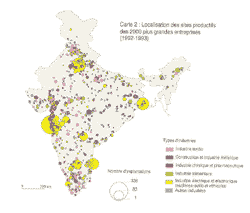| |
 |
 |
|
 |
 |
|
 |
 |
|
 |
| Industrial Decentralisation and Urban Development in India with consideration of South-East and East Asian States |
 |
| Completed Project |
 |
 Decentralised industrialisation, hailed as a competitive alternative to the classic city-centred industralisation model, may be more conducive to stimulating local initiative and allowing more balanced development. Decentralised industrialisation, hailed as a competitive alternative to the classic city-centred industralisation model, may be more conducive to stimulating local initiative and allowing more balanced development.
The objective of this project was to undertake a comparative analysis of socio-cultural and economic processes that foster industrial growth in small and medium towns and the vertical integration of these towns with national and international production systems in Asia.
This scientific endeavour was the result of cooperative efforts between three national research teams (Indian, Dutch and French).
The project received some financial support from the UNESCO Programme on Management of Social Transformations (MOST) because, in the opinion of the international Scientific Steering Committee of this programme, it addressed important development policy questions from a comparative perspective.
This comparative research project combined different levels of investigation (local, regional etc.) in order to analyse local-global linkages that are of increasing importance in a context of trade liberalisation and economic globalisation. To investigate industrial decentralisation and its impact, the project aimed at bringing together several research networks and to prepare the ground for possible extension to other institutions and regional settings.
The project's specific objectives were:
1. To explore the conditions of industrial decentralisation; a number of key issues were examined on the process of industrial decentralisation and its integration in regional, national or international economies, such as:
-Specific patterns of organisation (e.g., sub-contracting) that facilitate economic development: political and administrative environment, social structure and its degree of dynamism; integration of smaller urban units within broader economic networks; comparative advantages of small firms in terms of responsiveness to changing demand and capacity to innovate; extent to which these new economic opportunities rely on the segmentation (e.g., along gender and ethnic lines) and the vulnerability of the labour force.
2. To explore the relative advantages of a new economic rationale favouring the decentralisation of decision-making by private and public agents (compared to a large or centralised structure associated with urban concentration, which remains the norm in many developing countries).
Project Outputs:
Dynamiques spatiales de l'industrialisation
Kennedy, Loraine; Kermel-Torrès, Doryane; Schar, Philippe (ed.)
UNESCO-MOST, Regards, 2002
Industrial Decentralization and Urban Development in India with Consideration of South-East and East Asian Cases, Pondy Papers in Social Sciences 23, French Institute Pondicherry, 1997
MOST Discussion Papers:
Urban Development, Infrastructure Financing and Emerging System of Governance in India: A Perspective Amitabh Kundu, 2000.
Industrial Growth in small and medium towns and their vertical integration: The case of Gobindgarth, Punjab, India, 2002.
-------------------------------------------
Project Coordinator
Germán Solinís
g.solinis@unesco.org
Image: Map –Production sites of the 2000 biggest enterprises of India (1992-93) © Vol. 8 Géographie Universelle, Belin-RECLUS 1995 |
|
|
|
| Start Date
|
15-07-1996
|
| End Date
|
15-07-2002
|
|
|
|
|
|
|
|
|
|
|
|
|
|
|
|
| Lead Organization / Sector / Office
|
UNESCO MOST Programme
|
|
|
|
|
|
|
| Associated Organization(s)
|
Jawaharlal Nehru University; French Institute of Pondicherry; Centre for Indian and South Asian Studies; University of Amsterdam
|
|
|
|
|
|
|
 |
 |
 Email this page Email this page  Printable version Printable version
|
 |
|
|


